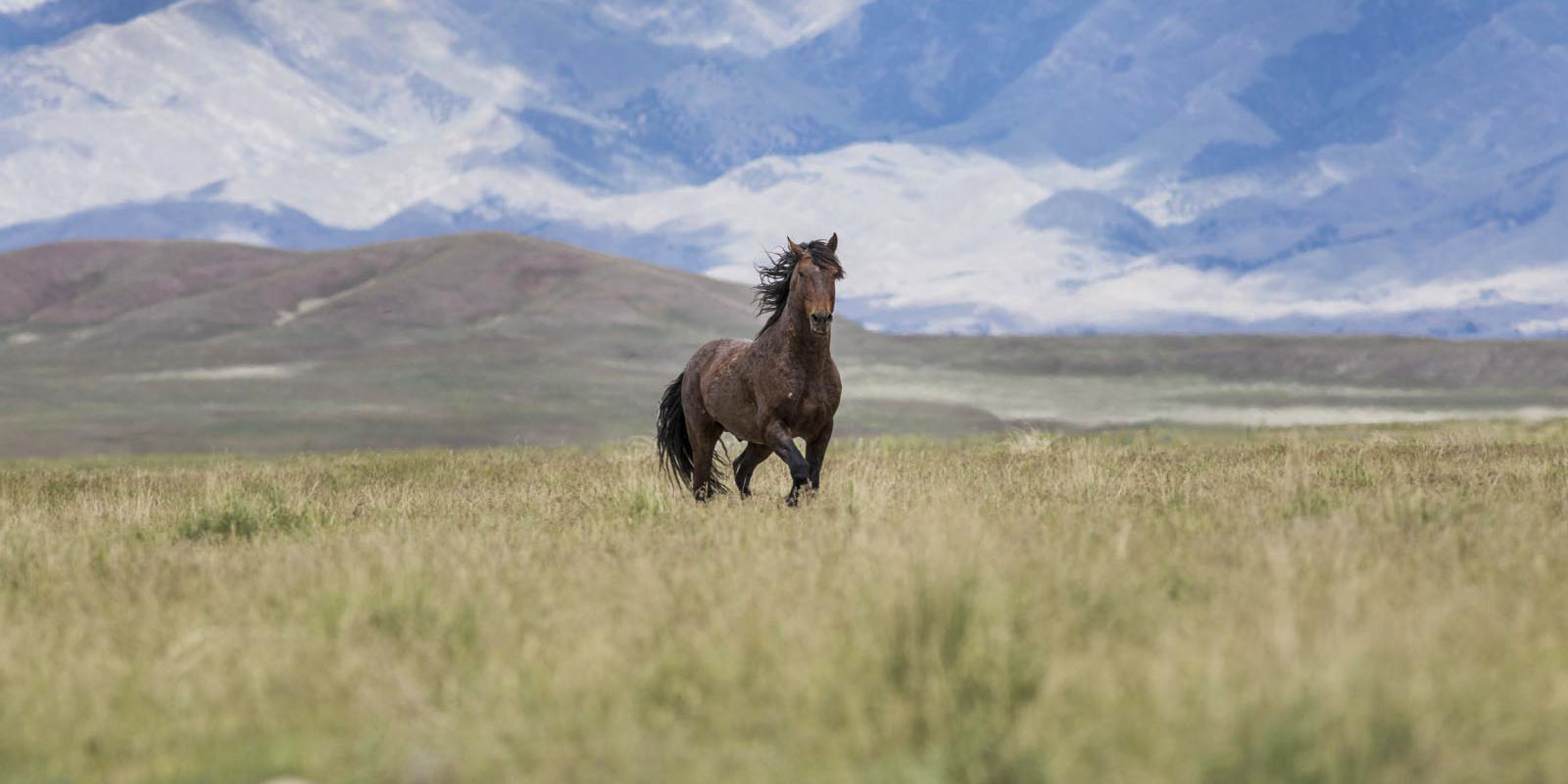The omnibus spending package the Senate approved today contains a provision that would make it easier for the Bureau of Land Management to adopt out or transfer wild horses and burros, reducing the growing number of animals under the agency's care.
But the provision has angered animal rights advocates, who say it contains too many loopholes to protect thousands of wild horses and burros from being slaughtered.
At issue is a section in the omnibus package to fund the federal government through September — originally requested by the Obama administration last year — that would allow the Interior secretary to "transfer excess wild horses or burros" BLM has removed from federal rangelands "to other Federal, State, and local government agencies for use as work animals."
The provision would authorize the secretary to "make any such transfer immediately upon request" of a government agency, such as the U.S. Border Patrol. The provision includes language stating that the animals cannot be killed or sold or transferred to any entity that would slaughter them "for processing into commercial products."
But it allows transferred horses and burros to be euthanized "upon the recommendation of a licensed veterinarian, in cases of severe injury, illness, or advanced age."
It's that language that has wild horse advocates outraged.
Ginger Kathrens, executive director of the Colorado-based Cloud Foundation, said BLM "has a history of misinforming the public" about issues related to wild horses.
"Couple this with the vague 'illness' and 'advanced age' language" in the omnibus provision, "and the potential exists for the killing of thousands of horses," said Kathrens, a member of the BLM National Wild Horse and Burro Advisory Board.
Suzanne Roy, executive director of the American Wild Horse Campaign, agrees, saying the group is "outraged" by the provision.
Roy said the provisions against slaughtering horses for commercial purposes are "well-intended but have loopholes that open a back door big enough to drive a slaughter truck through."
She added, "There is no enforcement mechanism, no requirement for transparency, and no penalty for violating the prohibitions on slaughter and killing."
In addition, she said, language allowing animals of an "advanced age" to be euthanized is too vague and needs to be defined clearly in the provision.
"We call on Interior Secretary Ryan Zinke to put in place the mechanisms for transparency, accountability, traceability and enforcement to ensure that the will of Congress and the American people to protect wild horses and burros from mass killing and slaughter is upheld," she said.
BLM support
The provision in the latest omnibus bill was requested last year as part of President Obama's fiscal 2017 budget proposal (Greenwire, Feb. 10, 2016). But until now, it was never included in any approved spending package.
BLM officials say it will go a long way toward relieving the financial burden on the agency to care for the more than 46,000 wild horses and burros it has removed from federal rangelands and placed in off-range corrals and pastures.
BLM warned last year that if it cannot adopt out or transfer to other government agencies a significant number of the wild horses and burros in holding, it will cost the agency more than $1 billion to feed and care for the horses during their lifetime (Greenwire, May 12, 2016).
BLM last year estimated that, in addition to those in holding, there are another 67,000 animals on federal rangelands — approaching three times the 26,715 horses and burros that BLM says federal rangelands can sustain.
BLM is required by the Wild Free-Roaming Horses and Burros Act of 1971 to remove the excess animals in order to protect native wildlife and other rangeland resources.
Neil Kornze, BLM's former director, told a House Appropriations subcommittee last year that the agency was "overwhelmed" by the growing number of wild horses and burros on public lands across the West (E&E Daily, March 4, 2016).
Zinke has vowed to address the issue during his tenure.
Reducing the number of wild horses and burros to "appropriate management levels" is included in a BLM "priority work" list designed to guide the agency during the Trump administration.
"It's a really sensitive issue because there's a lot of America that looks at a horse as a pet, and there's a lot of Westerners that look at a horse as livestock. But we should all look at a horse as a managed asset. Because overgrazing a horse is no different than cattle out there or anything else," Zinke said in March during a meeting with members of the Public Lands Council, which includes ranchers.
"We are going to take action on the horses," he said. "I got it."
The omnibus provision is a good step, said Jason Lutterman, a spokesman for BLM's Wild Horse and Burro Program.
Currently, Lutterman said, if BLM wanted to transfer horses to the Border Patrol, for example, each individual agent would have to personally adopt the horse, which remains BLM property for one year until a veterinarian confirms the horse is receiving proper care.
"That's something that's not very streamlined or efficient for our purposes," he said.
Lutterman said the provision's safeguards will prevent horses from being slaughtered.
"The real point of this is to find homes and work for these animals so they are not adding to the cost we have of caring for them," he said.
But Roy said she was surprised to see it in the omnibus unveiled this week.
The Senate today passed the $1.1 trillion bipartisan spending package; the House voted to approve it yesterday. If President Trump signs it into law, it will make the first time in more than a decade that Congress has used a spending package to amend the Wild Free-Roaming Horses and Burros Act, Roy said.
As such, she argued, it undermines the 1971 law.
"Our problem is that this provision uses a spending bill to amend a unanimously passed act of Congress to protect wild horse and burros as part of our national heritage," she said.
Reporter Corbin Hiar contributed.


